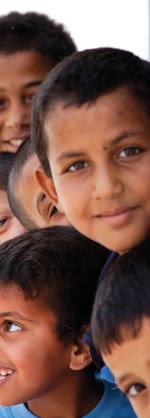[AS
ALWAYS PLEASE GO TO THE LINK TO
READ GOOD ARTICLES IN FULL: HELP
SHAPE ALGORITHMS (and
conversations) THAT EMPOWER
DECENCY, DIGNITY, JUSTICE &
PEACE... and hopefully
Palestine]
.jpg) |
A general view of part of the Cremisan valley in Beit Jala.
(MaanImages/Charlie Hoyle) |
In Cremisan, our land represents our existence
Father Ibrahim Shomali is the Parish Priest of Beit Jala, Bethlehem District.
Since the beginning of our struggle for Cremisan, we have been
determined to tell the world about the story of a small Palestinian
community that, like many others, is threatened once again with
dispossession and colonization.
Beit Jala had already lost two
thirds of its lands to the Israeli settlements of Gilo and Har Gilo,
leaving our town with only 4,500 dunams of land. Our land represents not
only our heritage and our olives represent not only our presence: they
represent our existence.
As Palestinians we have gone for painful
stories. In Beit Jala, we saw the refugees flee in 1948, the
settlements grow since 1967, and the oppression engendered by a military
occupation that aims at annexing our land. We witnessed the historic
compromise made by the PLO, recognizing Israel on 78 percent of historic
Palestine, which we all believed would bring peace.
But Israel
decided otherwise through its insatiable appetite for land. Since the
PLO recognized Israel and accepted a two-state solution on the 1967
border, Israel has accelerated settlement construction and other
elements of its colonial enterprise. Our town, due to its proximity to
Jerusalem, was a natural target for Israeli settlements.
When
Israel announced its plans to build the annexation wall, Palestine went
to the International Court of Justice, and in 2004 obtained an
unequivocal opinion: The construction of the wall in the occupied
Palestinian territory, including in and around East Jerusalem, and its
associated regime, violate international law. Nevertheless, Israel has
continued to build the wall with impunity.
For the Bethlehem
district, and Beit Jala particularly, the annexation wall meant, in the
words of Bishop Desmond Tutu said, to be condemned by strangulation. We
saw how Israel continued to usurp our land.
First, Israel
severed our connection with Jerusalem for first time in Christianity's
2,000-year history. Second, Israel denied us access to our lands and
natural resources, including our water. And now, Cremisan, the beautiful
valley of our kindergarten, convent and winery, and the home of our
yearly procession, will disappear behind this illegal wall.
The wall is being used to link the settlements of Gilo and Har Gilo, consolidating the Israeli annexation of our land.
As
a parish priest, I could not remain indifferent to these destructive
acts. Our duty as clergy is to provide hope and fight for love, justice
and peace. Israeli settlements and their network of walls, fences,
checkpoints and settler-only roads destroy any prospect for peace.
I
could not let my community’s hope for their future be fully
extinguished. And since the world was deaf and blind to our predicament,
we decided to call upon God for help. We mobilized our community to
pray every Friday on the land and amongst the olive trees that Israel
aims to take.
We decided to pray with the olive trees, because
they represent our history rooted in this land. These olive trees alone
stood with Jesus Christ at the Gethsemane, according to our Holy Bible.
They cried with him, and now we were crying with them.
Our
prayers brought international attention. Suddenly, hundreds of
communities around the world were praying for Cremisan. The Holy See
rallied to our cause. The Government of Palestine lent us support, with
President Abbas dedicating his Christmas message to our nonviolent
campaign to keep our land. The Archbishop of Westminster, Cardinal
Vincent Nicols, prayed for us during his Christmas homily.
Dozens
of archbishops, bishops and priests from Italy, France, Spain, Brazil,
Argentina, Andorra, Belgium, South Africa, Canada, the United States,
Germany, Sweden, Norway, Portugal, Jordan and Egypt, joined our prayers
at Cremisan. The World Council of Churches and numerous Catholic,
Evangelical and Orthodox communities prayed in communion with the people
of Beit Jala.
I myself delivered a letter to His Holiness Pope
Francis, who also committed himself to our cause. The Catholic Church
has remained united against the annexation wall, despite Israeli
allegations to the contrary.
Paradoxically, the only place where
Palestinians can attempt to defend their land from Israeli expansionism
are the Israeli courts. Unable to bring our case in international
courts, we depended on the ingenuity of our lawyers and the
steadfastness of our people. Recognizing the justness of our cause, the
Israeli Supreme Court
delayed the case at least until July 30th.
We
hope that the visit of His Holiness Pope Francis in May will highlight
the struggle of the Palestinian people, Christians and Muslims, for
justice and freedom. Then we will hope for another miracle: the
definitive end of the Cremisan wall, the end to the nightmare of the
occupation, with its illegal settlements, fences and walls.








.jpg)







.jpg)